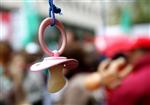 |
 |
 |
||
    |
||||
|
||||

Early pacifier use linked to shorter breastfeeding
|
|
Reuters Health
Monday, March 16, 2009

Drs. Hanne Kronborg and Michael Vaeth of the University of Aarhus found that women who gave their infant a pacifier in the first weeks of life were less likely to continue breastfeeding their babies.
In Denmark, registered nurses visit newborns and their families soon after the baby is discharged from the hospital. To investigate whether early breastfeeding technique and pacifier use might affect breastfeeding success, the researchers had health visitors specially trained in breastfeeding counseling visit 570 mother-baby pairs.
At the visit, the nurse observed the mother breastfeeding. If the mother was not using an effective technique (for example, the baby wasn't firmly "latched on" to the breast), the nurse provided feedback, guided the mother to use a more effective technique, and then observed a second session.
At the first visit, which occurred an average of eight days after the babies left the hospital, half of the mothers were having breastfeeding difficulty, most frequently with positioning the baby or latching on. While these problems were not associated with how long the mother ultimately breastfed her child, problems with sucking and milk transfer were, according to the report in the medical journal Birth.
Correcting a mother's breastfeeding technique at the nurse visit did not have any influence on duration of breastfeeding, the researchers found.
"Prolonged guidance may be necessary if correction is needed," they say. It's also possible, they add, that "ideal or rigid" recommendations of how women should breastfeed could make women feel less confident, and thus undermine her breastfeeding success.
Nearly two-thirds of the women reported giving their baby a pacifier. Pacifier use was associated with a shorter duration of breastfeeding, independent of breastfeeding technique.
Use of the pacifier "should be avoided in the first weeks after birth by mothers who want to breastfeed," the researchers conclude.
SOURCE: Birth, March 2009.
Reuters Health
© 2009 Thomson Reuters. All rights reserved. Reuters content is the intellectual property of Thomson Reuters or its third party content providers. Any copying, republication or redistribution of Reuters content, including by framing or similar means, is expressly prohibited without the prior written consent of Thomson Reuters. Thomson Reuters shall not be liable for any errors or delays in content, or for any actions taken in reliance thereon. "Reuters" and the Reuters Logo are trademarks of Thomson Reuters and its affiliated companies. For additional information on other Reuters media services please visit http://about.reuters.com/media/.
Related News:
More News on this Date
Related MedlinePlus Pages:
| Home | Health Topics | Drugs & Supplements | Encyclopedia | Dictionary | News | Directories | Other Resources | |
| Disclaimers | Copyright | Privacy | Accessibility | Quality Guidelines U.S. National Library of Medicine, 8600 Rockville Pike, Bethesda, MD 20894 National Institutes of Health | Department of Health & Human Services |
Date last updated: 17 March 2009 |
